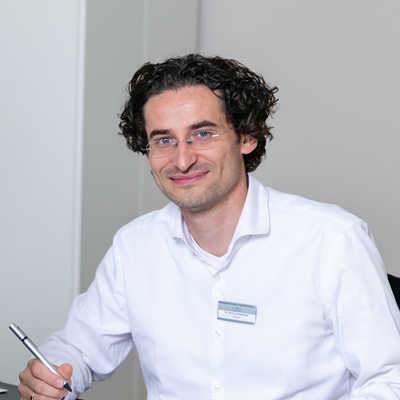Private clinic for sleep disorders
We help you through the day and night
Chronic insomnia (sleep disorder) is said to occur when sufferers fail to get sleep at least three nights in a row (and more frequently) per week for a period longer than six months. The rest phase is used by the brain to process impressions of the day and to separate the important from the unimportant.
Our brain needs sleep to regenerate and process information and transfer it to long-term memory. Almost one of three Germans regularly suffers from problems falling asleep or sleeping through the night. The (long-term) consequences are severe and range from exhaustion and fatigue during the day to weakening of the immune system and reduced stress resistance.
The pressure of suffering is high, as everyday life can often no longer be mastered due to nightly sleep disturbances and the associated fatigue. The fear of not being able to sleep again quickly leads sufferers into a vicious circle that leaves both physical and psychological traces. If those affected are not adequately treated in time, chronic insomnia can lead to depression, among other things.
To improve the quality of sleep as quickly as possible, sufferers quickly turn to sleep pills, which can help in acute phases. Long-term efficacy studies, however, indicate that certain sleep aids can lead to long-term dependence or further promote sleep disorders. Learn more in our patient information on sleep disorders
Get advice from our experts now at +49 3996 140490.
Symptoms of sleep disorders
Those affected by a sleep disorder suffer from numerous different symptoms:
- Nervousness
- Irritability
- Freezing
- Depressed mood
- Weakness in concentration
- Weakness in performance
- Increased sensitivity to pain
- Difficulty finding words
- Daily fatigue
Causes of sleep disorders
The reasons for chronic insomnia are manifold, and usually, there is more than one underlying cause. Over time, the actual trigger often becomes less significant, but the sleep disorder persists because it has already manifested itself.
- As precursors or accompanying symptoms of psychiatric disorders such as depression, anxiety disorders, dementia, substance dependence
- Neurologic diseases such as multiple sclerosis, Parkinson’s disease, epilepsy, brain tumors, movement disorders, or strokes
- Nighttime respiratory disorders
- Hormonal disorders such as pituitary disease, thyroid disease, adrenocortical disease
- Disorders involving pain
- Medications and drugs
- Sleep environment and habits
- Private and professional stress

